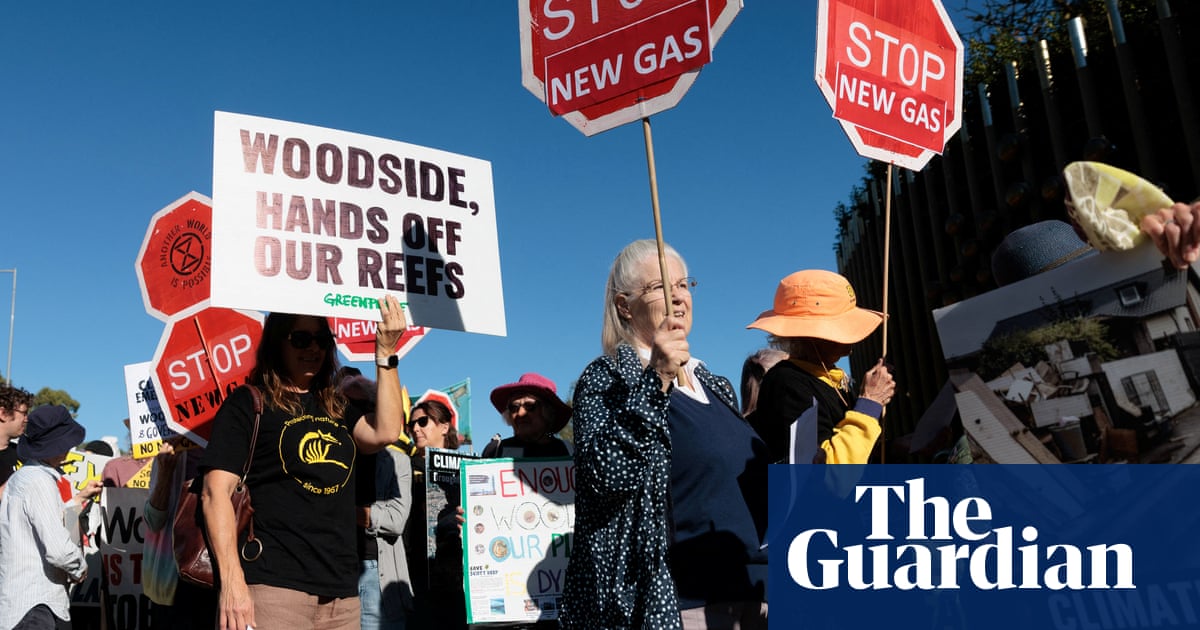Woodside Energy has withstood a rebuke by shareholders of its climate plans by garnering sufficient support to retain its chosen board members and approve executive pay plans at a fiery annual general meeting on Thursday.
A diverse group of investors, including fund managers and governance organisations, opposed the re-election of high-profile Woodside director Ann Pickard, a former Shell executive who chairs the committee responsible for overseeing climate risk at the Perth-headquartered oil and gas company.
There was also a push by shareholders to vote down Woodside’s remuneration report.
While there was a moderate protest vote recorded against both resolutions, Pickard was re-elected with a comfortable majority, and the pay plans were approved, according to preliminary voting results.
Sign up for Guardian Australia’s breaking news email
Critics believe Woodside’s strategy isoverly reliant on offsets, not aligned with Paris climate agreements, and does not seriously consider emissions produced by those using its gas.
The super fund, Hesta, said ahead of the meeting it had voted against various resolutions including the re-election of Pickard over concerns that Woodside had no formalised net zero target.
“We believe the steps taken by Woodside so far fall short of what is needed to position it for the global transition to a low-carbon future and the company needs to do more to materially address the concerns voiced by investors,” a Hesta spokesperson said.
Alex Hillman, lead analyst of the Australasian Centre for Corporate Responsibility, said Woodside was allocating most of its capital expenditure to “high-cost fossil fuel projects in an industry that is in structural decline”.
“This persistent pattern of investor dissent and Woodside’s failure to adequately respond shows this is a company with a major governance problem,” Hillman said.
Woodside is on track to become one of the world’s biggest gas producers after recently giving the go-ahead to a $US17bn ($26bn) development in Louisiana, and has unveiled an aggressive company-wide plan to double production within several years.
Woodside was strident in its defence of its operations on Thursday at a meeting that was paused on multiple occasions to remove whistle-blowing protesters.
The Woodside chair, Richard Goyder, said the company was an important part of the energy transition to renewables.
“We are determined for Woodside to play a constructive role in the global response to climate change, and are taking meaningful steps to achieve this,” Goyder said.
Sign up toBreaking News Australia
Get the most important news as it breaks
after newsletter promotion
He said decarbonising the world is made harder if “coal-to-gas switching, or carbon capture and storage are taken off the table”.
While many oil and gas companies state their support for the landmark 2015 Paris agreement, policies often allow for the development of new fossil fuel reserves.
According to Intergovernmental Panel on Climate Change analysis,greenhouse gas emissions from existing fossil fuel infrastructureare more than enough to push the world beyond its climate goals.
Shareholdersvoted down Woodside’s emissions planat last year’s AGM, but the vote was nonbinding. The company angered some shareholders by not having a follow-up vote on the plan at this year’s meeting.
On Thursday, the protest vote against the re-election of Pickard came in at about 20%, while the remuneration report received a 15% “against” vote, according to preliminary results.
Brett Morgan, senior analyst at activist group Market Forces, said most investors had failed to increase pressure on Woodside after voting down the company’s climate plan a year ago.
He said investors have given Woodside the “green light to massively increase emissions”.
